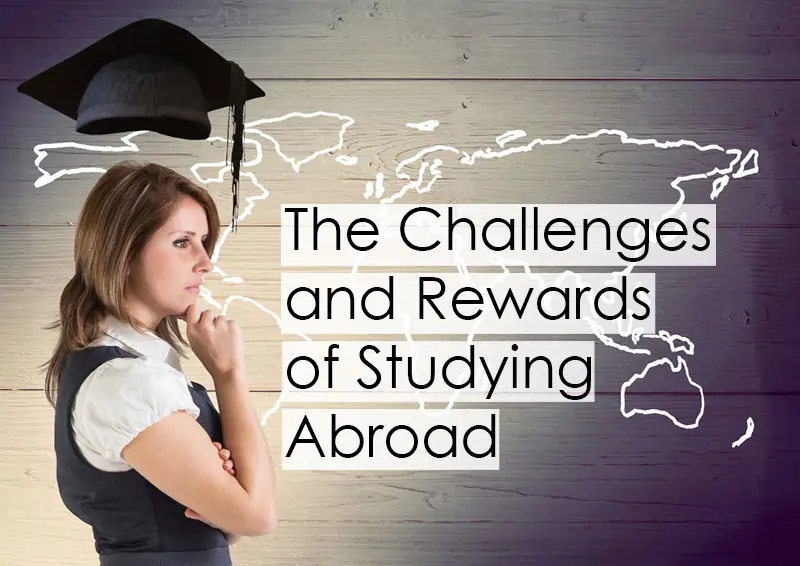The Challenges and Rewards of Studying Abroad

Studying abroad is an exciting opportunity for any student. It comes with challenges that test individuals personally, academically, and professionally, while also providing an unforgettable experience. Just like the research paper helpers assist students in their academic journeys, studying abroad enriches their educational experience and personal growth.
To determine whether or not a study-abroad program is right for you, consider the following guide.
The Challenges of Studying Abroad
1. Finding accommodations
On-campus residencies are often in high demand, meaning they fill up fast. Some students may be required to look for housing outside of campus, which can lead to potential scams or additional costs. It’s important to be extremely diligent when arranging for a place to stay while you are abroad.
2. Time zones
Adjusting to a new time zone can be difficult, especially when it is a significantly drastic one. When considering studying abroad, students should keep in mind the difference between the local time zone and the one where their family lives. Making a plan to remain connected with those back home ahead of time can help alleviate some stress.
3. Language barriers
If you are visiting a country where you do not speak the primary language, then you may face communication difficulties. Learning the new language ahead of time or practicing key phrases could make it easier to speak with people who live there. You could also choose to travel with someone who is fluent in the primary language to help minimize the language barrier.
Additional challenges that study-abroad students may face include:
- Financial management
- Homesickness
- Culture shock
- Navigation
- Climate changes
- Electronic compatibility
- Managing academic expectations
- Connecting with new people
Adjusting to a New Environment
1. Keep an open mind
Whenever you travel somewhere new, it’s important to keep in mind the possible cultural and societal differences there may be. Remaining open to new ideas and ways of living will ensure you have a positive experience abroad.
2. Bring reminders of home
Studying abroad can be an exciting and informative opportunity. However, that doesn’t mean you won’t eventually miss home. Bringing keepsakes and mementos that remind you of home is a great way to help mitigate homesickness. In addition to providing a sense of security, these items may allow you to compare cultural experiences with other people you meet abroad.
3. Spend time with other study-abroad students
Of course, a big draw of studying abroad is experiencing a new city and interacting with locals. When you first arrive, though, the culture shock can be overwhelming. Connecting with other study-abroad students allows you to meet people who share similar goals and, potentially, backgrounds. These individuals can offer the necessary support needed to adapt to your new lifestyle and surroundings.
Other adjustments that study-abroad students may need to account for include:
- Observing local behaviour
- Integrating into a language
- Exploring the new environment
- Staying in touch with home
- Giving time to adjust
Coping With Homesickness
1. Know the signs
You may begin feeling homesick without even realizing it’s happening. Before you can start to find a solution or receive the right support, you must first know what to look for. Some indicators that you’re beginning to feel homesick are:
- A recurring urge for home-cooked meals.
- The sensation of missing your house.
- An overwhelming desire to be back with your loved ones.
- The sudden or continuous impulse to return home.
2. Allow yourself to feel your emotions
Homesickness can occur at any point. Sometimes, it may hit you right as you leave to go abroad, or it could be a while before you feel anything. Regardless of when the feelings begin to set in, it’s important to give yourself time and space to experience the emotions fully.
When a study-abroad student feels homesick, it is recommended they connect with loved ones back home and share their feelings.
3. Build a social network
Whenever you’re studying abroad, it’s crucial to develop a circle of support in the places you are staying. This built-in sense of connectivity will help reduce feelings of anxiety, loneliness, and unease, while also giving you the chance to meet new people.
Consider getting involved in organized social activities or volunteering locally. Look for people who share common interests.
Financial Management
1. Plan ahead
In addition to covering the cost of tuition for whichever program they choose, there are other expenses that study-abroad students must consider. The specifics of these costs will vary depending on the location and program. Some financial factors to account for are:
- Transportation, both to the location and while you are there.
- Travel insurance to ensure you and your belongings are protected.
- Health insurance that is certified in the location you will be staying.
- Extra food that is not provided by the study-abroad program.
- Any tourism activities you hope to participate in.
The further ahead you plan, the more room you will have in your budget for the necessary elements, as well as any emergency or leisure events that come up.
Related reading: What Does It Cost To Study In Australia For International Students?
2. Track your spending
It’s not enough to put together a budget for your trip abroad and then spend freely while away. In order to keep your finances on track, you should regularly monitor your spending and break down any as it happens.
Set up a consistent schedule—daily, weekly, or monthly—to review your transactions, ensuring you are spending within the predetermined limits.
3. Look into scholarships
Similar to attending school domestically, many study-abroad programs offer different scholarships, awards, bursaries, and funding support opportunities. Often, the qualifications are listed alongside the application process, and students can determine if they’re eligible before even getting accepted.
There are also funding options available outside of the institutions themselves. Several awards and grants are aimed at students looking to study abroad. The more avenues you explore, the better chances you have of receiving financial support.
The Rewards of Studying Abroad
1. Gain a global outlook
Participating in a study-abroad program allows students to gain a global perspective on the world and their chosen field. Having a strong global competency provides a deeper understanding of how different communities utilize similar skills.
2. Diversify your education experience
A study-abroad program can help set students apart from their peers. The unique learning experience offered by studying abroad ensures students develop new skills while simultaneously engaging in a learning environment that extends beyond the traditional classroom.
3. Personal growth
New experiences (both good and bad) have a way of pushing us to become better versions of ourselves. The same can be said about studying abroad because the experience is often challenging, yet incredibly rewarding. When students choose to step outside their comfort zones, they open themselves up to developing new problem-solving skills and discovering different cultures.
Other benefits of studying abroad include the following:
- Stand out to prospective employers
- Have the opportunity to travel
- Continue to expand your education
- Learn about a new culture
- Hone different language skills
- Discover new interests
- Make lasting connections
- Improve application for future graduate school admissions
- Gain valuable life experience
Unparalleled Cultural Immersion
When studying abroad for the first time, it can be difficult not to impose your own cultural beliefs on the new environment you’re in. In order to have the best experience possible, it’s essential to keep an open mind and embrace your surroundings to the fullest.
A few helpful tips on how to embrace complete cultural immersion are:
- Rather than try to prove your preconceived notions of an area or culture, focus on observing, listening, and describing what you experience.
- Try to keep an objective outlook as much as possible.
- Don’t be afraid to ask questions and attempt to learn everything you can, but don’t forget to actively listen at the same time.
- Give yourself permission to make mistakes, especially if you’re trying to learn a new language.
- Attend culturally significant events.
Learning New Languages
Learning a new language—or practicing one you already know—can be a major benefit of participating in study-abroad programs. By surrounding yourself with a different language every day, you can become more fluent and learn various ways of communicating with people.
Studying a language abroad has many benefits:
- You will be fully immersed in the language daily.
- You can connect with your own personal cultural history.
- You have more opportunities to practice your skills.
- You can make connections with new people.
- Knowing another language can help you down the road.
The Advantages of Studying Abroad for Career Growth
1. Internationally recognized qualifications
Many study abroad programs offer students the opportunity to travel while still maintaining a high standard of education. Employers, as well as future academic institutions, often favour applicants with international recognition and qualifications.
2. Develop necessary industry experience
Studying somewhere that offers careers in your chosen field could help set you apart from future competition. Participating in a study-abroad program would allow you to gain valuable industry experience, as many curriculums require field placements in order to pass.
3. Learn from international industry experts
The faculty who teach, as part of many study-abroad programs, are experts in their given field. As a student, you will have the opportunity to learn from industry leaders who have established global careers.
Why study abroad?
Study-abroad programs allow students to step outside their comfort zone, and experience their course of study beyond the classroom. By immersing yourself in a new environment, you not only have the chance to travel but can also improve on any existing skill sets.
As the world continues to expand socially and technologically at a rapid pace, it’s more important than ever to be a global citizen.



